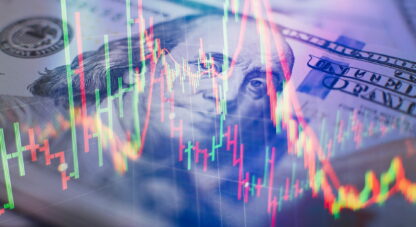Podcast: Play in new window
- Michael Hartnett “Every Fed Tightening Cycle Creates A Crisis”
- A little bit of chaos worldwide gives a temporary dollar boost
- What does Lucille Ball wrapping chocolate have to do with fed policy
The McAlvany Weekly Commentary
with David McAlvany and Kevin Orrick
“There is a degree to which destabilization, whether it is caused by us, supported by us, or what not, ultimately does solve this issue of how we fund our deficits, how do we bring dollars into the treasury market. With enough fear in the atmosphere, then guess what? You have buyers who say, ‘I prize U.S. treasuries if only for this one quality – liquidity.’”
– David McAlvany
Kevin:Just a few minutes ago, David, we were watching a clip together going back – you know, you can see anything these days on the Internet. We were just sort of reminiscing with Lucille Ball and Ethel and that famous scene when they were told to wrap chocolates as they came along on the conveyor belt. Everything was going fine at first when they had control of it, but then they started getting out of control. That’s when the humor started.
David:And of course, they couldn’t keep up, so they had to do things to make it seem like they were keeping up – take chocolates off and just throw them away. That way the boss wouldn’t know that they were missing any chocolates from the assembly line. But again, games can only be played for so long.
Kevin:Why does this apply? It applies because we were talking about the Federal Reserve. In managing money, they were given two mandates for years. One of them was to control inflation. The other was employment. But there is a third mandate that has been thrown in that they would love to think that they are keeping up with while they are wrapping that chocolate – wrapping the two things. But actually, that third mandate creates something that almost, in the end, has to lead to chaos.
David:Right. And something that you have taught me about from Newton’s gravitational and force laws, that you can handle a two-body problem, but when you add a third variable, that’s when chaos ensues.
Kevin:That’s right. For those who are listening who are not familiar with that, when Newton came up with his laws of gravity and force it allowed people to understand, from a mathematical way, how two bodies would orbit each other. You can make predictions hundreds of thousands of years into the future and be mathematically accurate, but if you add a third body – let’s say you add a third planet to that – it almost always ends in chaos. It is what they call a non-closed form solution. It’s unpredictable. Going back to these three mandates, with the Fed now trying to control the markets and bring market stability to the first two mandates, it can’t end well.
David:After the March rate hike the Fed still has two expected hikes this year, and three total for 2019, as well, according to the Fed’s forward guidance. That is what they are suggesting they will do. This week’s market actions suggest that the Fed can, and in fact, may have to find excuses not to act, not to raise rates through the remainder of this year.
Kevin:This has been your point for the last few weeks – how can they?
David:And if they do, it’s going to be in light of a shift in sensitivity to market accommodation – again, less sensitive now than in the past. For the last 30-40 years the Fed has been very sensitive to market volatility.
Kevin:The question is, will Powell be different? Is he different? We know there are some guys – Bullard – who don’t think they should raise rates. But will Powell be different?
David:We will have to see because March was the first indication that he doesn’t mind a little bit of discipline, so he’s bringing in rate increases and is not really concerned what the implications are, he is sticking to the discipline. So will the larger committee, the FOMC committee, maintain its disciplines and focus on inflation rates and unemployment? Or, as you are suggesting, is there going to be that third and unofficial mandate coming back onto the scene? Is it going to displace the other two? Again, a focus on price stability and unemployment. Again, what are they trying to do? It’s an influence of public sentiment, and you do that via the markets by directly buoying prices within the markets through your purchasing of assets.
Kevin:Or talking about it. This is something that has been interesting through the last few years. We have watched at the Federal Reserve, one person will say, “Yes, let’s raise rates.” And then they will see what the market does. And then you will have someone else come in and they will say, “Oh, no, no, no. We didn’t mean that. We really don’t want to raise rates.” Now Bullard is the guy right now at the St. Louis Fed who is saying, “Uh-uh. Don’t raise rates.”
David:I can’t help but laugh these days when I hear Trump say anything. He’s saying something, he’s saying nothing, and he’s saying everything. “We are going to have a conference with the North Koreans – we’re not going to have a conference with the North Koreans – unless we do. And if we do, then we will have had one.” It’s kind of like, well, what are you saying?
Kevin:In a way that’s another three-body problem, but we can talk about that later.
David:“It’s on, it’s off. But it could happen, and if it happens then it happened.” So, you’re right. Bullard over at the St. Louis Fed used to be very hawkish, and it’s interesting because he has changed quite a bit. He is already suggesting, more on the dovish side, that no more rate hikes this year are warranted, that he is very concerned, he does not want to invert the yield curve, he does not want to send the wrong message to the market, because with an inverted yield curve – flat to inverted – and the market begins to say, “Hey, this is a precursor to a recession.” And he doesn’t want to say that. So he’s saying, “Look, let’s just pause here and do nothing.”
The implications of rising rates in the U.S. and the strengthening dollar are huge when you look around the world. And the Fed has actually claimed here in the last few months to have taken that into account, they are not concerned about the emerging markets. In their calculus everything should be fine, both for the emerging markets and for the U.S. markets, when in point of fact that is not happening. We have seen some chaos here in the emerging markets of late, and it does tie to a strong dollar.
So what are they working with? They are working with math, and we might even criticize that it’s merely math. Markets, ultimately, are driven by sentiment. And sentiment can overwhelm even the best efforts by the central bank community. That’s really what we have been seeing more of recently, and I think the Fed has to be cautious.
Kevin:I wonder if they look at history, because history shows if there has ever been a reversal –everbeen a reversal of rate hikes – when we saw the rate easing over and over and over throughout history. But that is always reversed with rate hikes. It is almost always followed by some form of liquidity crisis.
David:Yes. And it’s rate volatility, specifically, and most of the times the chaos comes from an increase in rates, maybe going back to that 1929 period, 1937 period, there are some exceptions. But Michael Hartnett over at Bank of America-Merrill Lynch – one of our favorite shotgun weddings of the last decade – was using a recycled chart that I’ve seen before, but what he was underscoring was a very important point. He said that every Fed tightening cycle creates crisis, whether it be 1929, 1937, 1970, 1974, 1982, 1987, 1994, 1997, the year 2000, 2007, or even the present tightening cycle. When you have those tightening cycles, crashes occur.
And he put it in axiomatic terms: “When you have a tightening cycle, then you have a crash.” I think what is critical to remember is that the implications of less liquidity in the system, which is essentially what is happening when you are raising rates, are more acute in particular markets. It is not universal, but you cause stress and strain in a particular market. So it is some asset class, in some geography, which takes the biggest hit.
Kevin:So it’s not always universal, just a stock market crash here, it’s somewhere.
David:Right. It could be the debt markets, it could be the real estate markets, it could be the sovereign bond market, it could be the equity market. Those years that we just mentioned led to U.S. bank problems in many instances. In many other instances there were liquidity crises which emerged instead in places like Latin America, Russia and Asia. We had the U.S. savings and loan crisis. It’s a little like the game Whack-A-Mole. There is no question that liquidity tightening as a result of rising rates is a disaster for someone. But the issue is whether or not you could hit the mole fast enough and hard enough, because the degree or severity of the next crisis relates to contagion.
Kevin:If you’ve ever played that game, and I have, you can watch somebody else playing and they can look like an idiot. You think, “You know, I could do this. This is not that hard.” And then you put your quarter in, or whatever it costs, and you realize that you can’t do it. That seems to be the case with what the Fed does. They can control things that they think are in their purview. But you brought up Latin America, you brought up Russia, you brought up Asia. Right now we have the emerging market situation – interest rates rising. They already owe us money, in dollars, and interest rates are rising, and the dollar is rising. How is that going to go?
David:Again, remember that the implications of any of those crises were the knock-on effects, the things that happened after the fact. So the Russian bond default, we had major implications here in the United States with Long-Term Capital Management and a collapse of an overly leveraged hedge fund.
Kevin:So it came home.
David:It did, and in a very unexpected way. The same thing in Asia, it became known as the Asian flu because it was spreading like a nasty illness throughout the whole region. So the financial interconnectedness makes this even more an issue in the modern era of finance. I think time will tell which geography it is, or which asset class is central in the context of the next crisis, but as you were alluding to, when the dollar strengthens, or the euro weakens because of implicit issues in one or more of the member countries, you have capital which flows – in this case, flows our way – then you basically have safe haven shifts.
Kevin:Last week you brought up something that was just bone-chilling to me. I just couldn’t get it out of my mind. It had to do with us borrowing 80% of what the world saves. We know that savings is what gives us resilience. How do bodies live for a long time? There is some sort of savings in the bank physically for a body to be able to do that. Usually when a person gets old and ends up dying it is because that bank is depleted. It is the same thing with a company. Companies can go through an awful lot and they are resilient if they have savings. If we are consuming, or borrowing, 80% of the world’s savings just for us to survive, where is the resilience in that?
David:Yes, 80% of the global savings funnels into our country to counter-balance our current account and trade deficits. And it’s rude. This is simply over-consumption on our part combined with under-savings here in the United States. Because we over-consume, and that habit is enabled by the credit markets, you have more products produced outside of the United States, they flow into the United States, and there is this difference between what goes out from us – again produced products from us versus consumed products that come in to us.
Kevin:And that’s where the trade deficit comes from that Trump is trying to respond to.
David:Right, doing some victory laps here recently with an agreement with China, the distortion that Donald Trump is trying to sort out with the Chinese is to shrink that current account deficit by 200 billion dollars by 2020, which is the equivalent of saying that we’re going to buy less from the Chinese and they must buy more from us to equalize the trade relationship and make it less import-centric into the United States.
Kevin:But let me ask you this. Is this just China? We buy from other countries, as well.
David:The problem with that strategy, if we want to follow the logic of one of our commentary guests, Steven Roach, who is the former chairman of Morgan-Stanley Asia, and one of their chief economists for many, many years, and he is now a Yale Business School lecturer, the problem is that the trade deficit is not a bilateral problem.
Kevin:It’s not a two-body problem (laughs).
David:(laughs) Right. In this case, last year we had a trade deficit with 102 different countries, not just China. China may have been one of the largest, but it was not the only one. If the Chinese say, “Fine, we’ll stop selling product X, Y and Z to the United States, that doesn’t really help us, because bear in mind that products which we are sourcing in China today, we are sourcing them there due to the low cost of production relative to other alternative sources of manufacture and production. So shutting down the exports of 50-100 billion dollars of product made in China – all that does is divert the sourcing of the manufacturing to a higher cost location.
Kevin:And it may be another country outside of the United States.
David:Right. Maybe one of the other 102-101 that we have relationships with, and run a trade deficit with. So by the time the product reaches our shore, the product which the Chinese have agreed, “We’re not going to produce this anymore, you can get it from someplace else,” by the time that product reaches our shore, not only is the consumer paying more – again think about how critical this is because that is the equivalent of a tax hike – but the trade deficit has likely grown, in nominal terms, due to larger dollar costs involved with that product acquisition.
So by approaching the issue as the current administration has, on a bilateral versus a multi-lateral basis, again, you have to address trade with the majority of your trade partners as opposed to just on a one-off basis. What you are basically doing, and what he has done, is move the jello around the plate, shifting production from one place, China, to other places, which unfortunately have higher cost geographies. And implicitly, what that does is, as I just said, it increases the price to the end consumer.
Kevin:In fact, you’re increasing the price, but you’re really not gaining the benefit on the trade deficit at all.
David:No. So no benefit on the trade deficit side, which was intended, and it does come at a high cost to the U.S. customer. So when I think of Peter Navarro and Wilbur Ross putting these things together, I wonder what they are looking at such that they can miss the macro implications of what they are doing. Because again, it is a little bit like just moving jello around the plate and pretending that it is no longer on the plate. It is still there, it’s just not in one mass, it’s in small pieces – whatever. They haven’t accomplished anything. The trade deficit was the issue.
Kevin:One of the open questions that we have had through the years is, when we’re not on the gold standard as a dollar how do we maintain our legitimacy? When we are then no longer just the only petro currency – the petro dollar – how do we then maintain legitimacy? How do we continue to borrow the amount of money, this 80% of world savings, how do we borrow that money? How do we draw them to the dollar? Do we enjoy a little bit of the chaos that is being created right now in the emerging markets? Are we enjoying some of the benefits of that by people fleeing to the dollar, not because it a gold or oil-based currency, but it is seen as a stable currency?
David:Kevin, if you look back at our foreign policy during the Cold War, one of the things that we were notorious for doing was destabilizing regimes. It was better for us to work with someone who was insane and cruel, but in our pocket, or in our hand, and could be controlled. And we were willing to destabilize regimes to get that person in power. There was no greater morality like, “Oh, you’re supporting a bad regime,” because we had a bigger battle at hand, and that was the fight of the Cold War.
Kevin:And we were also breaking alliance bonds. In other words, you don’t allow two, three, four countries to ally against you. You can tip them against each other.
David:Yes, so the fact that destabilization is to our benefit is not new for us. In this mess, you’re right – how do we fund our deficits? How do we create an appetite for mass quantities of U.S. debt? We entered the discussion on Italy because Italy is in a bit of chaos here in recent weeks. And to be frank, what is bad for the euro is good for the dollar, and is, if you want to follow the domino theory, terrible for the emerging markets. What is good for the dollar is terrible for the emerging markets, which again, is good for the dollar, driving foreign capital to U.S. treasuries on a safe haven bid.
Kevin:We call it flight capital.
David:Right. So there is a degree to which destabilization, whether it is caused by us, supported by us, or what not, ultimately does solve this issue of how do we fund our deficits, how do we bring dollars into the treasury market? With enough fear in the atmosphere, then guess what? You have buyers who say, “I prize U.S. treasuries, if only for this one quality – liquidity.”
Kevin:And that liquidity would be needed, in this particular case, because of problems that are brewing in a country that you have been bringing up on numerous occasions. Italy is nothing new. This has been on the radar.
David:I think, in our conversations, the question was, which of the two is a bigger deal, and which will come to the fore first, Italy or Spain? The political chaos that we have seen brewing in Italy has been there for a long time. It is now coming to the attention of the global audience because prices are shifting. And prices matter. My dad has reflected on this: “You just don’t care if a Starbucks is closing some shop, somewhere in the world, until it’s your Starbucks on your corner.”
Kevin:He does love his chai tea, doesn’t he?
David:Oh, he’s a chai tea fanatic. So the bond market is drinking a bitter brew in recent days – Italian roast, to be precise – and it’s the Italian markets which are being repriced radically, and people are paying attention because it is in their portfolios.
Kevin:Let’s talk about the repricing. How do you know a market is being repriced? It is the interest rate that they have to pay to borrow money.
David:Yes. Italian two-year note yields have been up as much as 170 basis points – that’s 1.7% in a matter of days, according to Bloomberg. I know discussing numbers on the fly and having lots of them in our conversation can diminish the impact of them, but that is a massive liquidity tightening, which for the Italian financial sector is the equivalent of removing oxygen, and still expecting everyone to function well, but do so in an anaerobic, oxygen-less state.
Kevin:Is that more than when we had the global financial crisis?
David:170 basis point move in a short period of time is more than we saw during the global financial crisis, and it happened in a very brief window. So yields are now at levels in Italy, last seen in 2012, the Italian six-month bills, the shorter term paper – they have been offered in the last three auctions or sales, and they sold at negative yields of 41 basis points.
Kevin:Because people are fleeing to shorter maturity? Is that what you’re saying?
David:No, it’s because there is a guaranteed win. The European Central Bank has been buying this paper to the point where you’re willing to bet that the European Central Bank is going to buy even more, and drive yields for negative to “negativer” – if you can say it that way. But this week, by contrast, instead of at negative 41 basis points, they sold at 1.21%, or 121 basis points. That’s positive, versus negative previously.
Kevin:So they are having to pay more, even for the short debt.
David:Oh yes. Yes. And that’s a very big deal, again, in terms of liquidity dynamics within the financial system, and that ultimately impacts how an economy functions.
Kevin:Well, usually the Europeans look at things and they measure them against Germany. Germany is seen as the mother ship. How does that balance that?
David:In Europe, the German bund is considered the risk-free rate, just like the U.S. treasury is here, and frankly on a global basis, the U.S. treasury is called the risk-free rate. Mr. Tactical Short, Doug Noland on our team, pointed out that spreads between the German bunds, the equivalent of our treasuries, and all of the other European paper, are widening. So you have the interest rates shrinking for the Germans and increasing everywhere else – the gap between them, that spread – widening, and we are also seeing that in U.S. treasuries, as well. We were at 3.08 on the U.S. ten-year last week, and it has since retreated to 2.87%.
Kevin:Because they’re moving into treasuries. We don’t have to pay as much to get people to – this is what we were talking about. Chaos elsewhere is going to drive people into the dollar, at least temporarily.
David:Right. A 21-basis point swing might not sound like much, but in a market as large as the U.S. treasury market and the ten-year where there is plenty of volume, somebody likes liquidity. Someone is saying, “I prefer liquidity.” When people start prioritizing liquidity over anything else, it does tell you something about a significant shift that has taken place in sentiment. The U.S. treasury market still offers that primary benefit – liquidity.
Kevin:One of the things we saw before the global financial crisis was that bad debt was being called good debt. Banks have to hold certain good debt, whether it is triple-A rated, or whatever you want to call it. They have to hold that on their balance sheet. But when you call bad debt good debt, when Standard and Poor, and whoever the rating services are, start getting sloppy and start giving good ratings to bad debt, it ultimately catches up, and that is what happened in 2008. Now, in Europe, I’ve got to think that some of these Italian bonds are in the bank accounts of some of these large European banks.
David:Well, they are, and not just in the bank accounts, but on account, as in the reserve assets of the banks. So Tier 1 capital, the top of the heap, the best quality capital of the bank – your largest Italian banks hold, individually, 10-15 billion euros of that paper, which is the equivalent of 150 to as much as 200% of their Tier 1 capital. And it is an issue for the banks because it implies this: Price volatility on the scale that we’re seeing in the Italian bond market is sufficient to flip an institution from solvent to insolvent overnight.
Kevin:They’ll never see it coming, either, because their calling it good capital.
David:That’s right. In the U.S. market, if someone is sitting on a boatload of treasuries they would say, “Of course, this is our very best collateral.” What happens if your very best collateral loses 20-30% of its value overnight? Then all of a sudden you have collateral calls, capital calls. You have the equivalent of things that lead to insolvency. That’s why it matters. So again, in a world of interconnected finance, it’s always good to know who is, and who isn’t, solvent. But more than that, you have Italian bonds and other European peripheral paper that has been one of the best investments. Think about this. It’s been one of the craziest things for me to rationalize. But it’s been one of the best investments since 2011. And I can’t help but think of the moth-to-flame analogy where you have high rates of return which attract lots and lots of investors. This is the bigger issue. You have in the Italian bond market several trillion dollars in debt outstanding, and it’s being rapidly repriced, which is more than inconvenient for European investors and for other investors around the globe, who again have basically said, “Nothing is going to happen here. Mario Draghi has promised. He has given us a guaranteed positive rate of return.”
Kevin:Oh, he’s been a buyer of first resort – you brought that out last week – a buyer, not of last resort, but of first resort. He’s the first one waiting at the door when the Italians open it up to borrow money.
David:It’s just fascinating to me that you can have an element like that, which is the defining element in the pricing of a market, which becomes irrelevant very quickly. Yes, Draghi has forced interest rates down across Europe via the bond purchases that he has been involved with and orchestrated. And the ECB has given the proverbial free lunch for investors, and those investors have been hopping on the European debt investor bandwagon. They’ve been doing that for a couple of years now. And it actually turns out that the lunch is not really free after all. Markets are not just a one-way bet. And again, that defining element in the market, as powerful as it is in the short run, in the long run does not have the sort of efficacy that they believed it did.
Kevin:Is it just countries, and just the European Union, or is it actual corporations that are also holding this?
David:This again goes to the idea of contagion and the idea of cross-exposure. BNP Paribas in France has been a major buyer of Italian debt. Dexia is a Belgian bank, another big buyer. And then, of course, you have hedge funds, institutions, individual investors, that have held onto some sort of a belief, like lightning never strikes twice in the same place, in spite of the fact that they have seen the Greek crisis recycle like a scratch on a record. You just know that it’s only an amount of time before – woops, here we go again – woops, here we go again – woops, here we go again. And somehow, Italy was going to be different.
I love dark coffee – love dark coffee – and some actually have given me this critique: “You have an under-developed palate. Don’t you know that dark coffee beans over over-roasted? They’re burnt.” That’s the argument that they hold up to me. Italian roast is up there near the most toasted. Maybe French roast is the very most.
Kevin:But you can get to bitterness once you get to a certain amount of toasting.
David:And that is what is not to like this week in the Italian bond market because the Italian bond investor is tasting the extreme bitter aftertaste, losing money on what Draghi gave the impression was a guaranteed win, a guaranteed bet.
Kevin:Dave, we’re going to back and play archived shows in a few years, and we’re going to say, “This central bank control, this guaranteed bet in the markets, that we always knew the central banks had our backs,” we’re going to look back and say, “It didn’t work.” It’s like, going back to Lucille Ball packaging those chocolates. It works for the first 30 seconds or so when you watch the clip. In fact, let’s attach that clip, just for fun. It’s a couple of minutes. Everybody can go back and remember what it was like. But we’re going to look back and say, “You know, that chocolate scene is exactly what happened to the central banks, not just in the United States, but worldwide.”
David:I think it’s worth mentioning that on a routine basis you have the idea of the central bank community rigging the markets, and that is often used as an excuse to stay the course in your investment themes, whether it is as a stock investor or as a bond investor. It’s kind of like a blanket version of the quote I’m sure you’ve heard, “Don’t fight the Fed.” Let’s include the Bank of Japan and the ECB in that. But they have the equivalent of superpower strength and they alone direct and control prices. I certainly agree that prices can be pushed around and influenced in the short term, and European debt would have to be exhibit A for that. We’ve seen that over the last few years.
But my main point is this. Look at the Italian situation and note that as the third largest economy in Europe, and a lynchpin for the success of the euro project, the ECB can no more control the pricing of that market than they can direct the weather from one day to the next. So again, if you’re concerned, as an investor, about the markets being permanently rigged, know that the powers that be are not capable, at scale, and over a long duration of during so.
Kevin:It’s what we talked about before. People are treating this as a two-body problem. They’re saying, “This is going to go on, not just for hundreds of years, but thousands, hundreds of thousands of years. Those two bodies, we can mathematically predict. It’s controlled.” The problem is, there are more bodies at work here, and it goes to chaos.
David:And we’re not talking just about price stability and unemployment, which is what the central banks of the world have generally fixated on. But when you bring in controlling prices in the marketplace, not just in the currency, but when you start trying to influence market sentiment, and the market buyers, and controlling activity in the economy through controlling asset prices, that’s an issue.
Ultimately, if you wanted to step back and say, “Can you kill the market? Can you have the powers that be ultimately dominate and control?” The answer is yes, there is a way, but that is to kill it. That is to nationalize it. But that’s a different issue. Italy, to me, is refreshing. It’s refreshing, not because I delight in the pain of others – this is not sort of schadenfreude – but because this is a reminder that the markets count votes, and the vote is in.
Kevin:It’s a little like when volatility started to come back in the market here, it was hurting people’s portfolios, but it was refreshing because we actually saw that the markets were still alive.
David:Right. And this is the way it should be. Italy has so much political confusion and chaos that economically the path ahead is no longer clear. And therefore a bet in the financial markets of Italy is a bad one. That is a reasonable process to go through. Again, political confusion, economic non-clarity, financial market abeyance. You just step back and say, “I don’t really know what to do, I’m just not going to engage. I want my money back.” Return of, versus return on, capital. That’s in play in Europe. And this is good to see because it reflects lack of control by the central banks, and return of control by market participants, the voters.
Kevin:Didn’t we see volatility – not market volatility, but voting volatility – enter the U.S. markets a couple of years ago during the Trump election? There was the group of people who felt like this was completely controlled. They’re still looking back wondering what happened to them. But volatility changed the day.
David:I think, ultimately, the Italian issue is an echo of the U.S. election in 2016. You have a new prime minister just announced in Italy, and the government is going to be organized around the Five-Star movement. The Five-Star movement is this rag-tag populist group which has completely upset all the established powers and political structures in Italy. It’s fascinating to watch.
Kevin:Do you remember what you were talking about in 2016 when you were asked to speak in South Africa at the economic forum? You were talking about the reversal of globalization.
David:Right. A big theme was the reversal of globalization. It was an economic forum in South Africa, the summer of 2016. The argument at the time was that there was a growing populism and nationalism that was reversing the priorities of globalization. There was a period of time when everyone was making money and it was very easy to define yourself as a good global citizen. Or if you lived in Europe, then you were actually more European than you were Italian or French or German, or what have you.
Again, in good times that works. When things begin to move in reverse, when you encounter economic imbalances, then you have the mass of people who are at odds with that broader vision. So you had the upsurge of Syriza in Greece, you had the Five-Star movement in Italy, you had the National Front in France, you had the Damos in Spain. Brexit was an expression of this in Britain. And of course, this fight between Trump and Sanders here in the U.S., they were all telling us that political volatility was on the horizon, it was everywhere.
That was one of the main themes I wanted to hit at the economic conference in South Africa. But this is why the Italian problem can’t be resolved overnight. The root is not financial. Yes, there are financial implications. Yes, we’re talking about financial banks and assets and things like that. But the reason why you’re seeing a repricing of those assets is that investors are having less clarity on what it means for Italy to be governed.
And will Italy be governed in the context of the euro? And what are the larger implications for the euro if Italy, under a populist movement, is no longer a part of the euro? So there are bigger questions, and again, it ties to politics. The implications are in the financial markets, but the root is politics.
Kevin:And when you’re talking about politics you’re talking about perception, and you’re talking about sentiment. We’ve talked about how at the Federal Reserve you have Powell coming out and saying, “We’re going to raise rates,” and you have Bullard coming out and saying, “No, we’re not going to raise rates.” We’ve seen sentiment and perception actually managed now for years.
If you’ve ever been part of a group or a club or a family where something is going terribly wrong, but perception is being managed only by what is being said, that only lasts for a season. You’ll have the people who are loyal to the people who are trying to manage the perception going along with it, but when it actually starts hurting the wallet, or worse, that’s when the perception breaks down. This is what you’re talking about. Italy is starting to show this is another sign that the sentiment is changing.
David:Albert Hirschman wrote the book, Exit Voice and Loyalty. I think I’ve mentioned it a number of times in the Commentary.
Kevin:Good book.
David:I would say that in line with Thomas Khun’s, The Structure of Scientific Revolutions, this is one that you need to know. You need to have read it, studied it, underlined it, and cross-applied it into a variety of different areas. Because just like Kuhn applies into a variety of places, whether it is literary criticism or the history of philosophy, of science, or what have you, so Exit Voice and Loyaltydeals with issues that are both relating to corporate structures, as well as national and political structures. I can’t recommend it highly enough.
I think you will see what is happening in Europe from a very different perspective, and begin to appreciate also what happens in the financial markets when participants are given three basic choices”: Loyalty, as you just framed it, ignore the problem and according to a party line, go forward. Give a voice to it and say, “Hey, wait a minute, this isn’t working for me.” Or quietly disappear into the night. And the exit function is what you begin to see when a market tide shifts and people just say, “No, I’m out. I’m gone.”
I opened the presentation down in South Africa with three quotes, and I think I’d like to end our conversation today with those because I think it’s healthy. Rudiger Dornbusch, contemporary economist, says that, “In economics things take longer to happen than you think they will, and then they happen faster than you thought they could.”
Kevin:Good quote.
David:And then, Lenin, because I’m such a fan.
Kevin:(laughs) Your dad loved to quote Lenin. He hated communism, but Lenin actually made some very true statements.
David:Here is Lenin putting ten pounds of mud into a five-pound sack. “There are decades where nothing happens, and there are weeks where decades happen.” To begin to see some of the volatility like we’ve seen in Italy, and I think, ultimately, the question is, the severity of the next crisis – where does it begin, and are they able to contain it such that it does not spread? “There are decades where nothing happens, and there are weeks where decades happen.”
Kevin:I think your third quote comes from a good friend of ours who passed away over this last year – Ian McAvity.
David:It ties to the populist theme, which is, when times get tough, economic nationalism and protectionism tends to rise, because it’s always easier to blame someone else for self-inflicted problems. And you’re right, Ian was a savvy guy. Should the game of Whack-A-Mole get out of hand, and these fingers of instability spread beyond Europe, I return to a very simple, but I think timely allocation prescription, which is: Number one, have sufficient liquidity to matter, have enough cash to matter. Secondly, hedge your long positions so you don’t take any big hits. And third – maybe I should reverse two and three in order, but the third is to hedge your liquidity with sufficient precious metals to offset any accrued losses which you may generate from the central bank maneuvering and devaluation (laughs), which is guaranteed to occur.
Again, have sufficient liquidity, hedge your liquidity, and hedge everything else that you have in a period of difficulty and turmoil. This is not to say sell everything that you have and be 100% in cash and gold. There will be some who opt for that. But, I think, make sure that you are protecting the downside. If you have legacy positions, do what you can to protect the downside of those. Keep sufficient liquidity, and hedge everything with a financial asset which is outside of the financial system, not in the daisy-chain of obligations and debt liabilities which virtually everything else is today.
















